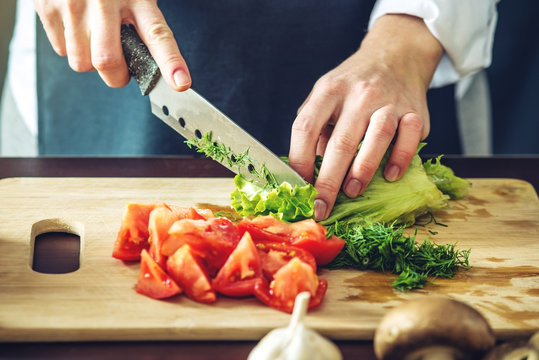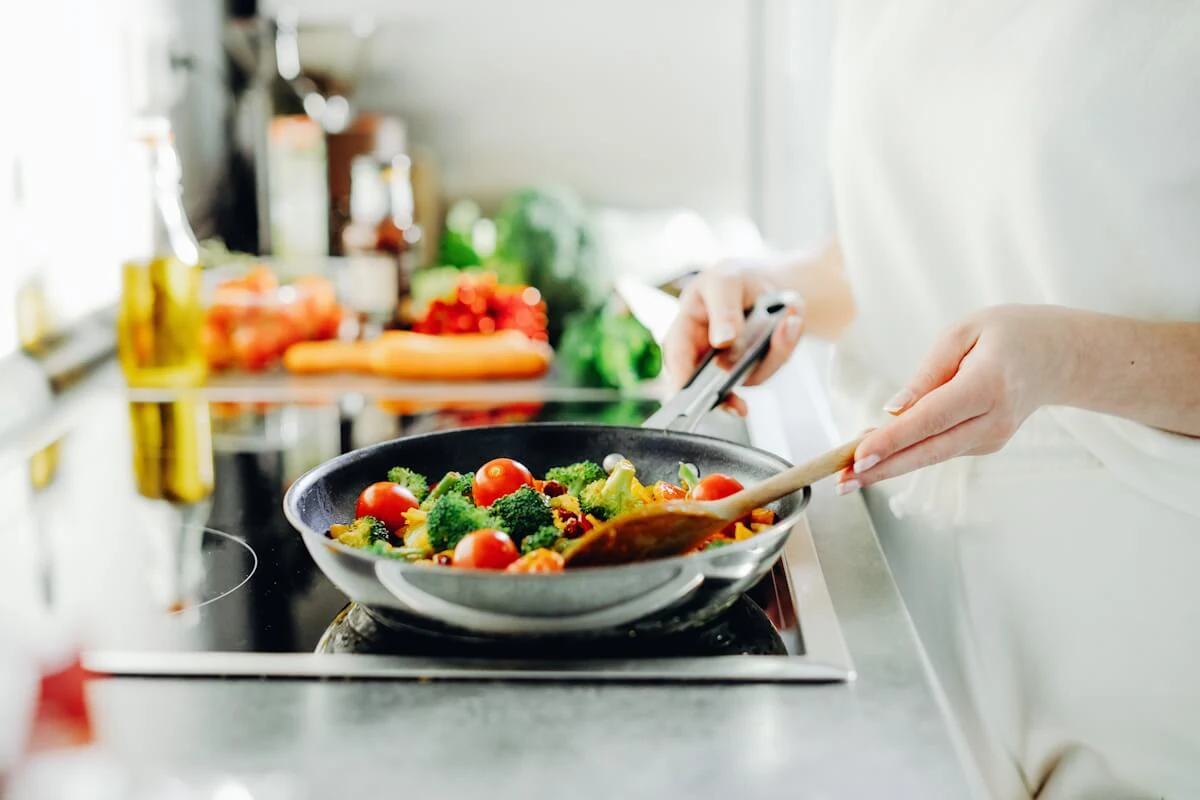
Cooking with less oil has gained popularity as more people prioritize healthier lifestyles. If you're looking to reduce calorie intake, manage cholesterol levels, or simply embrace a more nutritious way of eating, mastering the art of low-oil cooking can help you achieve your goals. This article will guide you through effective techniques, smart ingredient swaps, and flavorful recipes that prove you don’t need a lot of oil to create delicious meals.
Benefits Of Cooking With Less Oil
1. Reduced Caloric Intake
One of the most immediate benefits of cooking with less oil is the reduction in caloric intake. Oils are high in calories, and even small amounts can add up quickly. By using less oil or substituting with alternatives, you can significantly cut down the total calories in your meals.
This can be particularly beneficial for individuals aiming to lose weight or maintain a healthy weight, as it allows for larger portions of vegetables and other nutrient-dense foods without exceeding daily caloric goals. Practicing food safetywhile making these adjustments ensures meals remain both healthy and safe, as lower-oil cooking may sometimes alter cooking times or textures.
2. Heart Health
Cooking with less oil can contribute to better heart health. Many oils, especially those high in saturated fats, can raise cholesterol levels and increase the risk of heart disease. By reducing oil use and opting for healthier cooking methods, you can lower your intake of unhealthy fats.
Additionally, incorporating heart-healthy ingredients like fruits, vegetables, whole grains, and lean proteins can further support cardiovascular health. Choosing cooking methods like steaming, boiling, or baking instead of frying helps reduce fat consumption, promoting overall heart health.
3. Better Blood Sugar Control
Lowering fat intake, particularly from oils, can improve insulin sensitivity and help regulate blood sugar levels. High-fat meals can lead to insulin resistance, making it harder for the body to manage glucose.
By cooking with less oil and focusing on whole, unprocessed foods, you can stabilize blood sugar levels and reduce the risk of type 2 diabetes. This approach is particularly beneficial for individuals with prediabetes or those looking to maintain healthy blood sugar levels.
4. Improved Digestive Health
Cooking with less oil can also support digestive health. High-fat meals can slow down digestion and may lead to discomfort, bloating, or other gastrointestinal issues. By reducing oil in your cooking, you can promote easier digestion and a healthier gut.
Additionally, cooking with more fruits, vegetables, and whole grains can enhance fiber intake, which is essential for a healthy digestive system. A fiber-rich diet aids in regular bowel movements and helps prevent digestive disorders.
5. Enhanced Nutrient Retention
Another significant benefit of cooking with less oil is the enhanced retention of nutrients in your food. Many cooking methods that rely heavily on oil, such as frying, can cause the loss of vitamins and minerals, particularly in vegetables. By using less oil and opting for methods like steaming, boiling, or baking, you can preserve more of the nutrients.
This is especially important for maintaining the health benefits of fruits and vegetables, which are packed with essential vitamins, antioxidants, and minerals. Cooking methods that utilize minimal oil often result in dishes that are not only healthier but also more vibrant and flavorful.
How To Cook Food With Less Oil?
1. Steaming
Steaming is one of the healthiest cooking methods available, as it retains the nutrients and natural flavors of vegetables. By using a steamer basket or a pot with a lid, you can cook vegetables, fish, and even grains without adding oil. Simply bring water to a boil and allow the steam to cook your ingredients until tender.
2. Sautéing With Water Or Broth
Instead of oil, try using water or vegetable broth to sauté your vegetables. Heat your pan over medium heat and add a small amount of liquid. This method works well for onions, garlic, and bell peppers, creating a flavorful base for soups and stir-fries without excess fat.
3. Baking Or Roasting With Minimal Oil
When baking or roasting, you can use a spray bottle filled with oil or a brush to apply a thin layer of oil to your dishes. This technique allows for even coverage with minimal usage. Alternatively, you can use parchment paper to prevent sticking while roasting vegetables, eliminating the need for oil entirely.
4. Using Non-Stick Cookware
Investing in high-quality non-stick cookware allows you to cook foods without added fat. These pans require little to no oil, making them ideal for eggs, pancakes, and stir-fried dishes. Just remember to use non-metal utensils to maintain the integrity of the non-stick surface.
5. Cooking With Natural Ingredients
Incorporate ingredients that provide moisture and flavor, such as fruits and vegetables. For example, using crushed tomatoes or vegetable purees in sauces can create a rich, savory base without added oil. Similarly, adding fruits like apples or peaches to baked goods can enhance moisture and sweetness.
6. Air Frying
Air frying is a revolutionary cooking method that allows you to achieve crispy, golden-brown textures without the need for excessive oil. Using rapid air circulation technology, air fryers cook food by circulating hot air around it, producing a similar effect to deep frying but with significantly less fat.
7. Poaching
Poaching is a gentle cooking method that involves submerging food in simmering water or broth, allowing it to cook without the need for oil. This technique is particularly beneficial for delicate proteins like eggs, fish, and chicken, preserving their flavor and moisture without added fat.
8. Grilling
Grilling is another excellent technique for cooking with less oil. Whether you're using an outdoor grill or an indoor grill pan, this method allows excess fat to drip away from the food as it cooks. Grilling imparts a smoky flavor and appealing char to meats, vegetables, and even fruits without the need for heavy oiling.
Smart Ingredient Swaps
To further reduce oil in your recipes, consider swapping out oil-rich ingredients for healthier alternatives. Here are some effective swaps:
1. Applesauce
In baking, unsweetened applesauce can replace oil in recipes like cakes and muffins. Use one cup of applesauce for every cup of oil to retain moisture while cutting down on fat.
2. Nut Butters
Nut butters such as almond or peanut butter can add richness to smoothies, dressings, and baked goods. Substitute half the oil in a recipe with an equal amount of nut butter to enjoy creaminess without added oils. With small adjustments like these, you can become a cooking pro, creating healthier versions of favorite recipes that retain flavor and texture.
3. Vegetable Purees
Purees made from vegetables, such as pumpkin or butternut squash, can replace oil in recipes like breads and pancakes. This adds both moisture and nutrients to your dishes.
Flavor Enhancements Without Oil
Enhancing the flavor of your meals without oil is simple and rewarding. Here are some tips to boost flavor naturally:
1. Herbs And Spices
Fresh or dried herbsand spices can transform the taste of your dishes. Try adding basil, thyme, rosemary, or chili flakes to infuse your meals with flavor without needing oil.
2. Citrus
Lemon or lime juice can add a zesty brightness to your dishes. Squeeze some juice over steamed vegetables or incorporate it into marinades for added depth without extra calories.
3. Vinegar
Different types of vinegar, such as balsamic, apple cider, or red wine vinegar, can enhance the taste of salads, roasted vegetables, and marinades, providing acidity that brightens flavors.
Delicious Low-Oil Recipes
1. Vegetable Stir-Fry With Broth
Ingredients:
- 2 cups mixed vegetables (bell peppers, broccoli, snap peas)
- 1 cup vegetable broth
- 2 cloves garlic, minced
- 1 tablespoon soy sauce
- Cook the garlic in a pan over medium heat until fragrant. Add the vegetables and broth, stir-frying until tender, and drizzle with soy sauce before serving.
2. Baked Herb Chicken With Minimal Oil
Ingredients:
- 4 chicken breasts
- 1 tablespoon olive oil (or less)
- 2 teaspoons mixed herbs (oregano, thyme, rosemary)
- Preheat the oven to 375°F (190°C). Rub the chicken with a small amount of oil and herbs, then bake for 25-30 minutes until cooked through.
3. Oil-Free Pancakes
Ingredients:
- 1 cup whole wheat flour
- 1 tablespoon baking powder
- 1 cup almond milk
- 1 banana, mashed
- Mix all ingredients until just combined. Cook on a non-stick skillet over medium heat until bubbles form, then flip and cook until golden.
4. Steamed Vegetable Medley
Ingredients:
- 2 cups mixed vegetables (carrots, zucchini, cauliflower)
- Salt and pepper to taste
- Steam vegetables until tender, about 5-7 minutes. Season with salt and pepper before serving.
FAQs
Can I Cook Everything Without Oil?
Most recipes can be adjusted to exclude oil, but results may vary. Experimenting with different cooking methods and ingredients is key.
How Does Cooking Without Oil Affect Flavor And Texture?
Reducing oil can change the texture, but enhancing flavors with spices, herbs, and natural ingredients can maintain deliciousness.
What Are The Best Oils To Use If I Must Cook With Some Oil?
Opt for oils with high smoke points, such as avocado oil or grapeseed oil, as they provide healthy fats without compromising flavor.
Are There Any Health Benefits To Cooking With Less Oil?
Yes, cooking with less oil can reduce calorie intake and lower the risk of heart disease while encouraging healthier cooking habits.
How Can I Store Food That Was Cooked With Less Oil?
Store leftovers in airtight containers in the refrigerator. Use within a few days for best quality and flavor.
Final Thoughts
Cooking with less oil opens up a world of healthy and flavorful options that can easily fit into your lifestyle. With the right techniques and ingredient swaps, you can enjoy delicious meals without the excess fat.
By incorporating these methods and recipes into your cooking routine, you'll not only enhance your culinary skills but also promote a healthier way of eating that everyone can enjoy. Embrace the challenge of cooking with less oil and see how satisfying it can be to create meals that are both nutritious and delicious.

